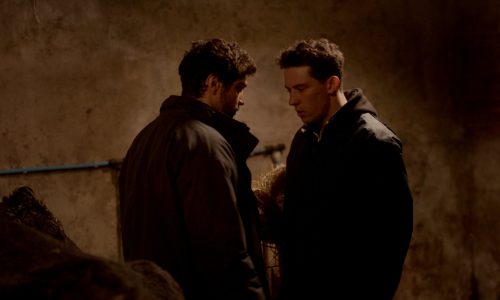After screening more than a hundred and fifty one features from nearly fifty countries, the Edinburgh International Film Festival has announced this year’s awards.

The gay romance drama God’s own Country has won the Festival’s top honour, the Michael Powell Award for Best British Feature Film. Directed by first timer Francis Lee, the film tells the story of a frustrated young Yorkshire farmer whose life takes a new path with the arrival of a Romanian migrant worker during lambing season.
The jury, including the composer David Arnold and the BAFTA-nominated writer Andrea Gibb, said the film had “a singularity of storytelling and consistency of vision. Assured direction with raw and endearing performances result in a film that has an authenticity that is both tender and brutal, a juxtaposition of landscape and emotion, which explores the question of what it means to be a man.” Lee – who until now has been best known as an actor – said he was thrilled with the honour. “After premiering at Sundance and Berlin it has been wonderful to see how the film has created a real resonance with people and that is why the Michael Powell Award feels so brilliant,” he added.
The award for the Best Performance in a British Feature Film was shared between Emily Beacham for Daphne and Anne Reid for her roles in both Kaleidoscope and Romans. The jury said the pair had portrayed “fascinating, complex and flawed characters who didn’t strive for your affection but commanded your attention.” Beacham said it had been “an extraordinary experience working on the unique and special Daphne.” The film is set in London but was supported by Creative Scotland. Anne Reid said it was exciting and totally unexpected to have won such a prestigious award.
The International Jury, including the actors Bernard Hill and Shauna Macdonald gave the prize for the Best International Feature Film to Kristina Grozeva and Petar Valchanov’s Glory, which it described as a “deftly acted, beautifully photographed and directed” film. Valchanov said, “It is a great honour for us to receive this award from Edinburgh International Film Festival, which has been preserving the traditions of good cinema the longest and carrying them over the generations. This award is a recognition not only for us, but also for Bulgarian cinema, which is currently on the rise again.”
The Spanish and UK co-production film Donkeyote was named the Best Documentary. Accepting the award, it’s director Chico Pereira said, “For some of us who live or lived in Edinburgh, it holds an extra special meaning: our formative cinema experiences have been with EIFF, and just to return for our UK premiere is an honour in itself.” Creative Scotland said the award was “a significant recognition of their talent and hard work and is testament to the quality of documentary filmmaking coming out of Scotland.”
The Best Short Film award went to Daisy Jacobs for The Full Story. The Short Film Jury praised it’s “originality, level of technical artistry and emotional poignancy.” Paloma Baeza’s Poles Apart was named the Best British Animation, voted for by the Festival audience.
The Festival also handed £2,500 in the shape of a Work in Progress award to Michal Sulima for Piano to Zanskar, a feature-length documentary about a piano tuner from London, delivering a piano to the Indian Himalayas. Accepting the award, the director said, “Given that our film has been entirely self-funded, it will go a long way towards helping us reach completion.”
With many of the award winners coming from Scotland, being supported by Scottish agencies or having links to Scotland, the Edinburgh International Film Festival often finds itself in the conflicted position of seeming somewhat parochial, while trying to build its profile internationally. But with many first-time directors being among the winning films, it’s one of those rare festivals where newer talent is launched, rather than having the expectation that film-makers should already have achieved an elevated status elsewhere.
